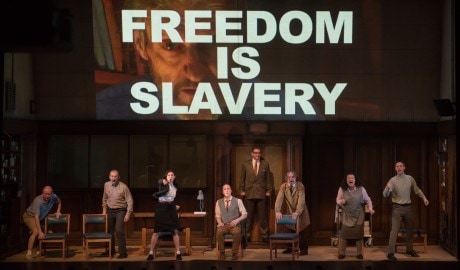Shakespeare Theatre Company has missed no opportunity to issue advisories to audiences about to attend the spectacularly intense Headlong production of George Orwell’s 1984, now on stage at the Lansburgh. An advance email from Artistic Director Michael Kahn to ticket holders warns accurately of “loud noises including gun shots, bright and flashing lights that create a strobe-like effect and scenes of graphic violence….” A sign in the lobby posts the same warnings. The light, sound, and special effects in this show surpass in visceral impact their every admonition.

Duncan Macmillan and Robert Icke, who audaciously adapted and directed it, faced the daunting task of finding 21st-century theatrical form for the iconic book Orwell wrote in 1948 about state suppression of thought and memory long before history was digital. Of this challenge Macmillan has said:
How do we achieve double-think, how do we deliver the intellectual argument, and also can we take along a 15-year-old who has never read the book while satisfying the scholar who has read the book 100 times?
The sensational shebang they came up with certainly delivers the sort of gosh-wow FX that 15-year-olds go to action movies for. At intervals that would sync with any adolescent’s distractable attention span, there booms and blazes another eye-popping, ear-shattering dramaticus interruptus.
And the script they came up with is cannily faithful to the original, in that it incorporates the usually ignored appendix to the book. This far-future coda—ostensibly composed in 2050, after the totalitarian state of 1984 has fallen—gave Macmillan and Icke license to be full-on meta, and they ran with it. Thus we see scenes of the surveillance and torture suffered by protagonist Winston and his paramour Julia in 1984 even as commentators from 2050 on stage at the same time talk about how that was then. And thus we see jumbo-screen video inserts into the stage action showing what’s going on concurrently in other rooms. All this heady layering and interconnecting is gosh-wow interesting too.
George Orwell’s hope in writing 1984 was to inspire resistance and courage of the sort that even if solitary and not collective can have effect in defiance of unjust authority. Describing this authorial intent, critic Michael Shelden writes in a program note,
The idea was that the battle against a regime infested with lies would never be lost if at least one brave soul refused to surrender the truth. The hero of the book, Winston Smith, is that last man. Watching his grim struggle allows us to wonder how long we might hold out against such tyranny and to question why any society would have relinquished so much power in the first place.
Macmillan and Icke’s adaptation and staging has to be one of live theater’s most razzle-dazzle interpretations of a literary classic. The question to be posed to the production—gosh-wow though it be—is whether it is faithful to the novelist’s hope that individual resistance and courage be inspired.
There comes a point during the scene when Winston is being tortured horrifically when he cries out to the audience, on whom the house lights have come up:
HOW CAN YOU JUST SIT THERE? GET UP! DO SOMETHING! HELP ME—HELP ME—YOU HAVE TO STOP THEM—PLEASE GET UP…
Of course nobody does. We get that this is a playwright’s conceit. We know to play by the rules of being an audience member. We know we have not literally been invited to volunteer to go on stage. Yet do we get the message that the very individual inaction, inertia, and complacency that gave passive assent to this fictional totalitarian takeover might be part of the problem in the real world here and now? And do we get the implicit message of Orwell’s prescient conception that we need to be mindful so we don’t become complicit ourselves in governmental mindfuck? Or if we don’t get that message, does that to some extent indict the integrity of the entire metatheatrical enterprise?
A case could be made that this staging of 1984, far from inspiring and motivating us to individual acts of courage and rebellion, actually numbs with its assault on our senses, its overload of gosh-wow effects, such that in the end we are lulled into the same complacent contentment that led Orwell’s doomed citizenry down the fateful path of trusting authority too much.
Go see it and decide.
Running Time: One hour and 50 minutes, without an intermission.
Headlong Theatre’s 1984 plays through April 10, 2016, at Shakespeare Theatre Company, performing at Lansburgh Theatre – 450 7th Street, NW, in Washington, DC. For tickets, call the box office at (202) 547-1122, or purchase them online.
RATING:
LINKS:
In the Moment: ‘1984’: A Loud Flash-Bang Grenade of a Theater Experience by David Siegel on DCMetroTheaterArts.
Robert Michael Oliver reviews ‘1984’ on DCMetroTheaterArts.




